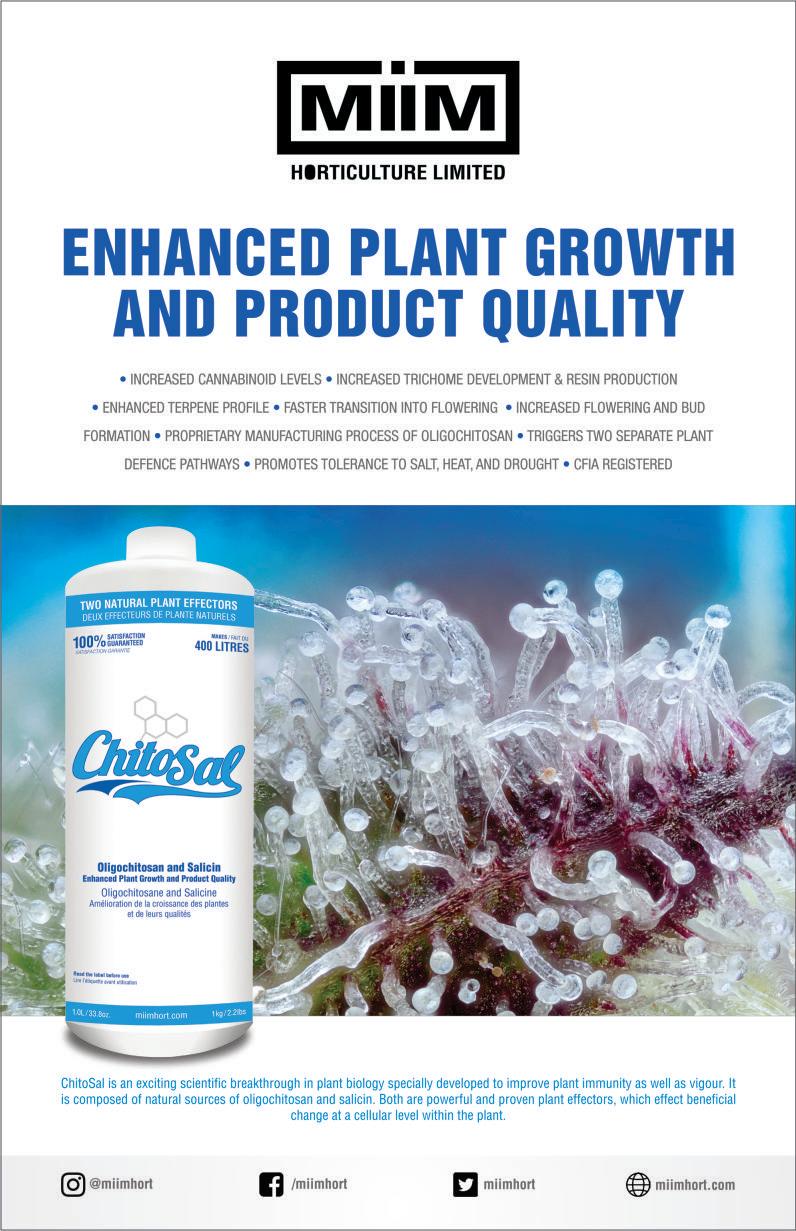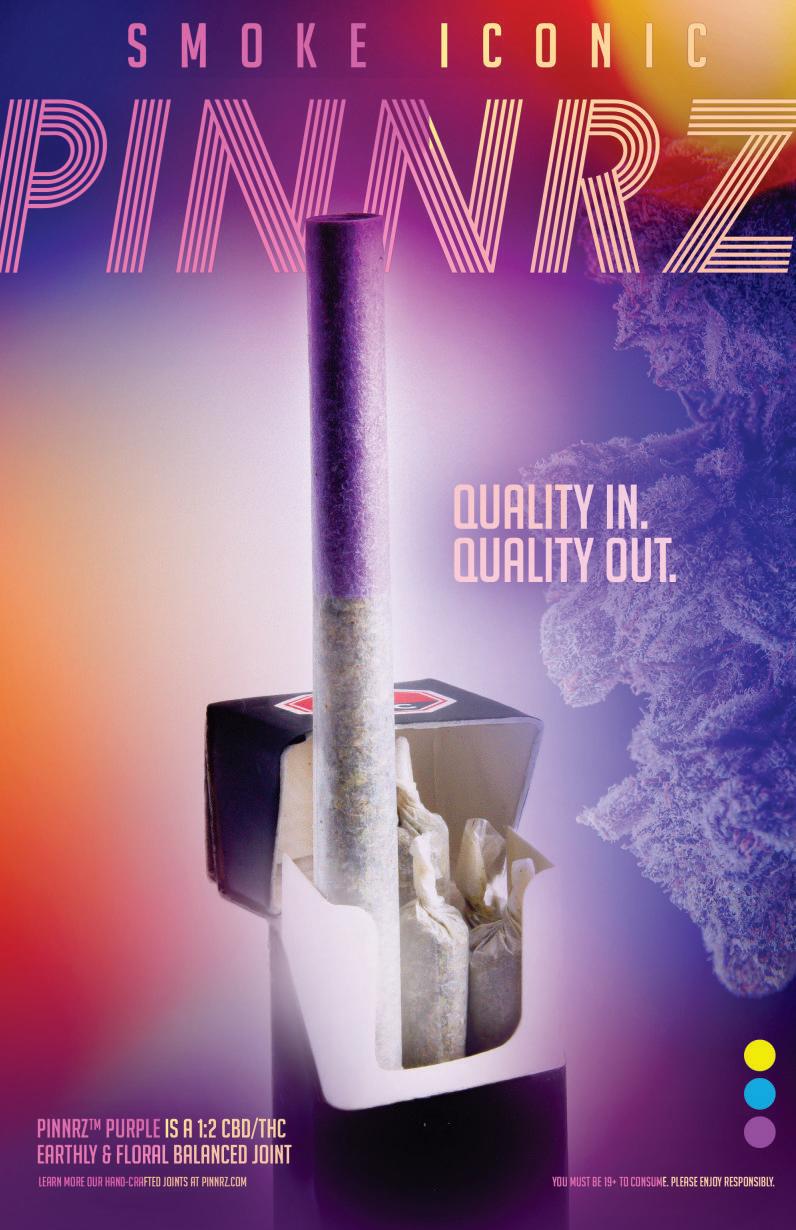



Publishing Group, we are committed to providing our readers with the most current, relevant, and reliable information available.
To help us maintain the editorial excellence and integrity of our publication, we have assembled a qualified Council of dedicated experts and innovators and natural health and cannabis to serve on HCM’s Editorial Advisory Board:
With the help of these industry authorities, HCM offers fresh timely and accurate information about natural health and wellness as it applies to cannabis. The board members lend their expertise to our process of developing and commissioning or editorial lineup, and a postpublication review of each issue which is invaluable in maintaining our more than nine year reputation as Canada's most trusted cannabis health and wellness resource.
Every effort is made to ensure that the majority of advertised products will be available for sale in Canada.
The information provided in this magazine is for educational and informational purposes only. It should not be used as a substitute for the advice of qualified and licensed practitioner or healthcare provider.
The opinions expressed here are not necessarily those of High Canada Media Group, it’s affiliates or parent company. Different views may appear in future articles or publications. Articles in HCM are copyrighted and must not be reprinted duplicated or transmitted without permission.
Drivenbyabalancedapproachtoensuring responsiblecannabischoicesandcreating positivecannabisexperiencesforCanadians, HCMstrivestoinformandeducateourreaders.
HCMisnotresponsiblefortheactions,services orqualityoftheproductsandservicesrepresented withinorreportedon.
Allmaterialpresentedisintendedforamature 21+audienceandisintendedforentertainment, educationalandinformationalpurposesonly
Formoreinformationonmedicinalcannabis, pleasespeaktoyourfamilyDoctor.
Allrightsreserved,HCMisprintedandproduced proudlyinCanada.FormoreinformationonHCM, pleaseemailusateditor@highcanada.netorvisit usonlineatwww.highcanada.net
www.highcanada.net
CyWilliams Publisher/Editor
TammiStanhope
OntarioEditorialTeam
XanderLandry BCEditorialTeam
TFPruden
AlbertaEditorialTeam
HarryWhite
OntarioEditorialTeam
RainbowSmithe
BCEditorialTeam
OnellCrawford GuestContributor
DaveMacAdam BCEditorialTeam
SaraJaneWilson BCEditorialTeam
SabrinaMohamed
OntarioEditorialTeam
ZaraBoorder
OntarioEditorialTeam
DebiFacey
OntarioEditorialTeam
HarryResin BCEditorialTeam
www.highcanada.net
www.highcanada.net
I S S U E 8 0 - M A R C H 2 0 2 3
C A N A D A’ S L E G A L C A N N A B I S C U LT U R E M A G A Z I N E
At High Canada Magazine
We are excited to be
celebrating this 81st issue, well into our 9th year of publishing High! Canada Magazine.

We are always evolving, always pivotingandalwayslookingfornew ways to bring some excitement and challenge to our daily grind of cannabis media work and content creation.We have been putting significant effort into our High! Canada Magazine Youtube Channel andareslowlybutsurelybuildingup oursubscribernumbers-Iencourage youtoheadoverandsubscribeifyou have not already for all sorts of awesomecannabis-focusedcontent.
We have also launched our newest sister publication - High! USA Magazine-anewmonthlymagazine focused on all thing cannabis in America. We are hyped beyond
belief and this new publication has been in the works for some tinme now.Itisarealpleasuretobeableto finallytalkaboutitandinviteyouto check it out. For more information visit-www.highUSA.us
As of this issue we are now biweekly for the foreseeable future. With so much going on within this vibrantsector-wefeltthebestway forustokeepourreadersuptodate was to double up on our issue runexpect shorter issues overall with twice the frequency.As I heard the keenkidssayrecentlyasIloadedmy groceries into my vehicle - pitter patterlet’sgetather...
Cy Williams Publisher/Editor High! Canada Magazine editorathighcanada.net DigitalDownloadsavailableat www.highcanada.net
Photographer - @RyitPhotography - Model @bdpowder


www.growupconference.com
Lift Events & Experiences Returns to Toronto,
June 1-3, 2023
ThenexteventfromCanada’s#1
Cannabis Conference & Trade Show will bring together thousandsofattendeesfromallpartsof thecannabisecosystem.
Highlyanticipatedandwithoutadoubt - Toronto’s hottest and most popular cannabis-centricevent.
Following on the tremendous success of Lift Vancouver in January, Lift Events & Experiences will return to Toronto, showcasing even more interactive presentations from cannabis industry experts, plus the

ultimate in new cannabis brand, product and technology discovery fromhundredsofpremiereexhibitors.
Lift Toronto 2023, which will bring together thousands of cannabis industry professionals and consumers from all parts of the cannabis ecosystem,willtakeplaceattheMetro TorontoConventionCentrefromJune 1-3,2023.
Speakerapplicationsarenowopenand potential speakers can apply to speak at Lift Toronto here. Lift is seeking energetic disrupters and established
lue-chip industry experts, along with b everyoneinbetween,forindividualand panel presentations showcasing lively, informative and sometimes provocative dialogue.
Topics of interest include but are not limitedto:
• Activism&Advocacy
• BudtenderEducation
• Ethics&Society
• Funding&Investments
• Growing, Processing & Extraction Innovations
• HempResearch&Applications
• International Market Analysis & Collaborations
• Lifestyle: Tourism, Cuisine, Entertainment
• Micro-Producers
• Psychedelics Research & Advancements
• RetailAcceleration
• Science&Technology
• Start-Ups
• Therapeutics&Treatments
If Lift Vancouver is any indication of what to expect, Lift Toronto will welcome a great many fresh faces to a buzzing expo floor. A survey following Lift Vancouver found that 50% of attendees were new to Lift and some 80% of attendees report that they will follow up with exhibitors to make a purchase, continue a conversation or pursueanopportunity.

“As we reflect on a warm, welcoming and very successful return to Vancouver, we’re also working very hard to create an unforgettable experience in Toronto,” says Lindsay Roberts,
Portfolio Lead, Lift Events & Experiences. “From speakers, panels and demos, to live entertainment and our Lift After Party, you can count on Lift Toronto to spark the important conversations and facilitate the connections that will lift the cannabis community in one ofourmostbelovedlocations.”
EventSchedule
Lift Cannabis Business Conference | Thursday,June1,2023
LiftExpoIndustryDays|Friday,June2 andSaturday,June3,2023
Lift Expo Consumer Day | Saturday, June3,2023
UpcomingLiftEvents:
Lift San Francisco: August 2-4, 2023 | Moscone Center. San Francisco applications will open shortly, and registration for both events will open in thespring2023.
AboutLift
Lift Events & Experiences serve the cannabis community as both a meeting placeandadestinationfordiscovery.With dates across North America, each Lift eventshowcasesleading-edgecontentand premiere exhibitors in a high-energy settingforthousandsofcannabisgrowers, processors, manufacturers, brands, budtenders, retailers, educators, advocates, regulators, consumers, investorsandmore–whilepayingtribute to the roots of this rapidly-evolving industry.LiftisproudlyproducedbyMCI. F
LiftEvents.com.
or more information, visit


www.hibnb.ca Where do you find the best 420-friendly vacations this fall and winter? www.hibnb.ca
THE AMERICAN RECREATIONAL CANNABIS MARKET WILL LOOK
THE AMERICAN RECREATIONAL CANNABIS MARKET WILL LOOK

VERY DIFFERENT FROM THE CANADIAN MARKET.
VERY DIFFERENT FROM THE CANADIAN MARKET.
One of the major differences
is that each province in Canadadecidedthemselves how cannabis retails sales would work. Ontario has chosen to let the government-runLiquorandControl Board handle commercial sales. British Columbia’s provincial government has elected to allow a mix of private and public cannabis retailers, while Saskatchewan and Newfoundland exclusively permit privatedispensaries.
The Canadian legalization bill set the minimum age to purchase cannabis at 18, however several of theprovinceshavemandatedthatit besetat19yearsold.Thisisinstark contrast to the legal age in the United States of 21. Home grows very among the provinces as most Canadian provinces have decided that 4 mature plants should suffice, but Manitoba has banned home cultivationentirely.
The U.S. marijuana market has traditionally been supplied by private grower and cultivators, while in Canada the federal government will have regulated control of marijuana production. Federally licensed growers will be the top of the supply chain and governmentofficialswilldetermine the minimum market value for marijuana.
After 20 years of experience, legal marijuana growers in the U.S. have the reputation of creating the best product in the world, scientifically grown and tightly regulated for quality and safety. Instead Canada has emerged as the dominant exporter in the burgeoning global trade of marijuana, whichArcView
Market Research and BDS Analyticsestimatedat$14.9billion in sales for 2019. Companies there are raising capital and building international trade ties despite

www.highcanada.net
having an unlikely climate to be an agriculturalpothaven.
The crop would be in high demand internationally perhaps the centerpieceofanewU.S.industry— if not for the regulatory conundrum inwhichgrowersoperate.
Because marijuana is legal in many states but still illegal federally, marijuanagrowersareunabletoship their products to other countries or evenotherAmericanstatesthathave legalized the drug. So while U.S. cannabis firms have driven product innovationandmasteredthescience of large-scale grow operations, they restlessly wait for the export curtain tolift.
Thepatchworkoflegalizationmeans cannabis isn’t always grown where it’seasiesttogrow,inwarmclimates with limited rainfall. It’s grown where it’s legal. California, Oregon and Colorado grow most of the country’s authorized marijuana as legallyisolatedislands.
That leaves cooler Canada as a somewhat odd choice to be the world’s leader in marijuana exports. WhenCanadalegalizedmarijuanain 2018,itsfirmscouldbelistedonthe New York Stock Exchange and NASDAQ. So Canadian companies represent a back door for U.S. firms toaccesscapitalandexportmarkets, and, for smaller firms, provide a potential exit strategy. Many U.S. marijuana growers are positioning themselves as attractive acquisition targetsforCanadianfirmseyeingthe lucrativeU.S.market.

Canadianfirmsareusingtheirhead start to sign trade deals and secure licenses to sell
internationally. While the market remainslimited,atleast30countries —includingMexico,Germanyand Italy have legalized medical marijuana. And the numbers are growing as scientific studies have demonstrated its utility for pain control,nauseaandglaucoma.
Cannabis taxes in the United States have reach exorbitant amounts as many dispensaries in California are tackingontaxesthatcanbeasmuch as 50% of the sale. This allows the black market to flourish as consumers will seek alternative mean for more affordable marijuana.Canadaisplanningtotax $1 per gram or one tenth of the products retail value. There will of course be provincial and federal salestaxinadditiontothecannabis tax,howeverthisisexpectedtobea fractionofU.S.taxrate.
a
an
m
riju
a
One of the biggest hurdles for cannabis retailers in the U.S. has been limited access to banking services. Most dispensaries are forcedtousecashorgiftcardstopay expenses, utilities, and payroll leaving them very susceptible to armed robbers. Since Canada does not consider marijuana as a Schedule I drug, cannabis retailers willbedeposittheirprofitsintotheir bank account as any other business would.
Early on in Canada’s medical marijuana legalization, some of the corporate banks were hesitant to work with cannabis businesses. Instead retailers sought financial assistance from small independent banks, brokerage firms, and investment banks. In recent years thebigbankingplayershavegotten more involved allowing dispensaries to establish bank accountsandcreditlines.
the federal health department has decided to mandate large warning labelswithspecificrequirementson fontsize,styleandcolor.
The Canadian labelling regulations leave little room for original branding or design. It’s clear that preventingsalestominorsisahigh priority, however, this also limits smaller businesses from differentiatingtheirproducts.
Canada allows recreational consumers to purchase cannabis

online directly from the government. This extremely advantageous for very remote regionsasthey’llbeabletoplacean order and have it delivered to their door. This will be nothing new for the Canadian Postal Service as they’ve been providing shipping services for the medical marijuana industry for quite some time. Upon delivery, the purchaser must be present, as they will not be allowed toleavethepackagewithoutseeing identification.
Canadian recreational cannabis have some regulations that may hinder retailers, distributors, and manufacturers. Labelling statutes couldbeseenasexcessivenowthat
America’s patchwork system of cannabis oversight is restricted to individual state markets, which has created a variety of problems for both businesses and consumers. Technically, cannabis is still federally illegal, and transportation between states is prohibited. This creates a large barrier to entry for companies that wish to expand to new markets, as well as confusion amongpatientsandconsumerswho are traveling between states with legal cannabis but cannot bring cannabisfromonestatetoanother.
Toaddtotheconfusion,somestates have reciprocity agreements that allow patients to possess or even procure cannabis from states other than the one they reside in. At the time of publication, 17 states had a reciprocityagreementinplace:
• Alaska
• Arizona
• Arkansas
• California
• Colorado
• Hawaii
• Maine
• Massachusetts
• Michigan
• Nevada
• NewHampshire
• Oklahoma
• Oregon
• Pennsylvania
• RhodeIsland
• Washington
• WashingtonDC
In these states, users are allowed to purchaseorpossesscannabis,butit is against the law to consume it anywhere but your personal residence or private venues (in accordance with local laws). This prevents consumers from using the productsthattheylegallypossess.
Additionally, a lack of national standards for legalization has largely prevented banks and traditional stock exchanges from workingwithcannabisbrands.Asa result of 2018’s Farm Bill, credit unions and some markets have

A lack of consistent regulations betweenstatesandinadequacyatthe federal level has also created an inconsistent market. States have varying quality control when it comes to lab testing to check for pesticides, molds and chemical residues while others can’t keep the productsontheirshelves.Stateslike Oregon have an oversupply, which hasbroughtdownthepricepergram to the lowest in the country. While Canadahashaditsshareofnational shortages due to an unexpectedly highdemand,eachofthestateswith legal cannabis in the U.S. must address this problem on their own, withoutfederaloversightorfunding foreducation.
Votingforpro-cannabissenatorsand representatives is the best way to bringnationalchange.Italsomeans working with local governments to
become favorable to hemp businesses.
demonstrate that a legal cannabis market benefits the community at large and can be enjoyed in a responsiblemanner.
Supporting the efforts of organizations like the National Cannabis Industry Association (NCIA) or Students For Sensible Drug Policy (SSDP) that lobby for change is another way to positively affectlegislation.
The legal requirements of cannabis quality is the baseline. At Happy Valley, we use best practices and industry standards from longstanding legal industries throughout the world as our model for moving thecannabisindustryforward.When it comes to raising the bar on cannabis standards, we choose to leadbyexample.
Most states require testing for microbes, pesticides, heavy metals, and harmful chemical residues in cannabis products. All states must
have seed-to-sale systems that can track where cannabis comes from andwhereit’sheaded.
Transparencyaboutyourproductsis essential to building trust in the cannabis industry. Transparency gives the industry as a whole cues for integrity in cultivation, production, testing, and consumption, which promotes a safer,moreresponsiblemarket.
The cannabis laws in the United States are changing rapidly, sometimes on a daily basis. It’s important that consumers and producers stay informed about the laws and pending legislation in the cannabis industry, and any areas they intend to visit. Knowing all of therulesofcannabispossessionand consumption no matter where you are will prevent you from encountering any issues while enjoyingthisuniqueplant.

StayInformed!
Our USDAcertified Organic Fertilizer is patented and designed to promote the growth and harvest from your vegetation, along with protecting yourself from the harmful synthetic chemicals found in traditional fertilizers.

Our nutrients are optimized for use in fertigation lines, and cause no clogging issues.



www.humblebeesbotanical.com The Only Vegan Organic, USDA Certi�ied Fertilizer On the Market. The Only Vegan Organic, USDA Certi�ied Fertilizer On the Market. Grow Cleaner. Grow Better. Grow Cleaner. Grow Better. www.humblebeesbotanical.com
SEEING THROUGH THE SMOKE
In his new book, physician and
cannabis expert Peter Grinspoon, M.D., separates fact from fiction, science from speculation, and research from reefer madness to offer a comprehensive and indispensable guideonusingmarijuanasafely.

Cannabishasgonemainstream.One in seven Americans uses some sort of CBD product. Ninety-four percent of Americans support legalization of medical marijuana, and 69 percent want total legalization. Consumers can now openly buy everything from their
favorite strain of Sativa to CBD pillows to THC bath bombs. Still, that doesn’t mean that myths and misconceptionsdon’tpersist.
Whether it’s the hard-dying, fearmongering lies spun by the War on Drugs and other prohibition campaignsortheutopiandaydreams oflong-timestonersandevangelists, we’re still confused about the leaf that we have been using for at least five-thousand years. Enter Peter Grinspoon, a physician, cannabis expert, and son of the late Lester Grinspoon, a psychiatrist and academic who risked a Harvard
career to challenge laws and beliefs aboutmarijuanalong b e f o r e i t w a s fashionable. In his new book, SEEING THROUGH THE

S M O K E : A
C A N N A B I S
S P E C I A L I S T UNTANGLESTHE TRUTH ABOUT
M A R I J U A N A
(Prometheus Books, April 20, 2023,
H a r d c o v e r ) , Grinspoon draws from a wealth of scientific research, clinical practice, and personal experience
t o d e m y s t i f y marijuana and give users no-nonsense guidanceontherisks and benefits of the drug that has been called everything from the devil’s lettuce to the key to worldpeace.
The book provides honest answers to (some) scary questions. Does marijuana cause psychosis? Is legalization leading to more traffic accidents, and is it safe to drive while high? Will toking make me lazy or lowermyIQ?Isweedaddictive?Ispot safe during pregnancy and when breastfeeding? Does cannabis help or worsen anxiety/depression/chronic pain/PTSD/insomnia/autism?Howcan I tell which cannabis strain is right for me? What if I’m taking other
medications? How can I detect when I’m being lied to about a benefit or risk? Grinspoon answers allofthesequestionsbydrawingon themostup-to-dateresearchandhis vastclinicalexperience.
Spiked research led to bad policy, widespread misunderstanding and mistrust. As a doctor, Grinspoon valuesscience.Healsoknowswhen it’s being spiked. Grinspoon shows how decades of cannabis research was conducted solely for the purposeoffindingharmandhowthe
areertochallengelawsandbeliefsabout c marijuanalongbeforeitwasfashionable. Inhisnewbook,SEEINGTHROUGH
THE SMOKE: A CANNABIS SPECIALIST UNTANGLES THE TRUTH ABOUT MARIJUANA
(Prometheus Books, April 20, 2023, Hardcover), Grinspoon draws from a wealth of scientific research, clinical practice, and personal experience to demystify marijuana and give users nononsense guidance on the risks and benefits of the drug that has been called everything from the devil’s lettuce to the keytoworldpeace.
The book provides honest answers to (some) scary questions. Does marijuana causepsychosis?Islegalizationleadingto more traffic accidents, and is it safe to drive while high? Will toking make me lazyorlowermyIQ?Isweedaddictive?Is pot safe during pregnancy and when breastfeeding? Does cannabis help or worsen anxiety/depression/chronic pain/PTSD/insomnia/autism? How can I tellwhichcannabisstrainisrightforme? What if I’m taking other medications? How can I detect when I’m being lied to aboutabenefitorrisk?Grinspoonanswers all of these questions by drawing on the most up-to-date research and his vast clinicalexperience.

Spiked research led to bad policy, widespread misunderstanding and mistrust. As a doctor, Grinspoon values science. He also knows when it’s being spiked.Grinspoonshowshowdecadesof cannabis research was conducted solely for the purpose of finding harm and how the government-grown product that was usedfortesting—whathecallsthe“moldy
mush” strain—was unfit to yield quality data. Theresultsweredisastrouscriminal policies, massive misunderstanding in both the scientific and lay communities, andanintensificationofthefailedWaron Drugs. It also sewed distrust among the many young people who need quality information about cannabis and other drugsthemost.
ReeferPessimistorCannatopian?Justsay no. It’s no surprise that in the wake of a “war” on drugs we have sharp polarization. On one side are the Reefer Pessimists, who say that cannabis offers no benefits and on the other, the Cannatopians, who think it offers only benefits. Grinspoon looks to the data and saysthatthetruthistobefoundsquarein the middle, with some clear benefits and some undeniable risks. It’s time for science-based, honest, and accessible educationtoreplaceproselytizing.
Doobie no harm: Doctors still don’t understand cannabis. The problem starts in medical school were doctors-intraining learn little to nothing about cannabis and the endocannabinoid system, and are still taught politically motivated falsehoods. Grinspoon urges physicians educate themselves about cannabisandtounderstandwhythatthey aretaughtsolittleandsopoorlyaboutit. He also calls for patients to “not let their doctors off the hook … Educate yourselves. Expect us to know this subject. Push back when we say things that aren’t true.” FUN FACT: Docs weren’t always allergic to cannabis. “Throughout the second half of the nineteenthcenturyandrightupuntil1937, when cannabis became effectively prohibited in the United States by the
Peter Grinspoon, M.D. is a primary care physician and cannabis specialist at Massachusetts General Hospital and an Instructor in Medicine at Harvard Medical School. He is a certified Health and Wellness Coach as well as a board member of the advocacy group Doctors for Cannabis Regulation, and has been providing medical cannabiscareforpatientsfortwodecades.
Dr.Grinspoonisawidelyrecognizedexperton cannabisscienceanddrugpolicy Heregularly appearsasanexpertonnationaltelevisionand radio programs, including The Daily Show, Good Morning America, NPR’s All Things Considered, NBC Nightly News, C-SPAN’s WashingtonJournal,FoxandFriendsandFox News. He is quoted frequently in the national media,insuchvenuesasPeople,theNewYork Times, New York Magazine, the Washington Post, USAToday, the Wall Street Journal, the ChicagoTribune,andtheBostonGlobe.Heisa TEDXspeaker.
Grinspoon’s Harvard Health articles have reached tens of millions of readers, have been widely referenced in the national media, and havebeencitedincongressionaltestimony His writing has been published inThe Nation, the Los Angeles Times and Narrative Inquiry in Bioethics.
Heistheauthorofthegroundbreakingmemoir Free Refills: A Doctor Confronts His Addiction, was the expert witness in the successful citizens’ 2019 lawsuit against the Massachusetts “Vape Ban” and a special consultantonaddictionissuestoJaggedLittle Pill’’s pre-Broadway run at the American RepertoryTheater.
“As marijuana goes mainstream, many lingering
doubts, contradictions, lies, and half-truths remain entrenched in the public debate. Peter Grinspoon has written a delightfully readable, informative, and timely book that shines a clear light through this maze of misunderstandings. Following in the family tradition - Grinspoon's father Lester wrote two seminal books on marijuana - Seeing Through the Smoke can help heal the scars left by the government’sfailedwaroncannabis.”
Rick Doblin, PhD, founder and executive director of the Multidisciplinary Association for PsychedelicStudies(MAPS)
“Peter Grinspoon is an ex-addict, marijuana enthusiast, and cannabis prescribing physician with a professional and moral obligation to know and tell the truth about cannabis’ relationship to driving, pregnancy, psychosis, autism, addiction, sleep, cancer, and much more. Never before have I read such an engaging and accessible review of the evidence.”
—EthanNadelmann,founderandformerexecutive directoroftheDrugPolicyAlliance
“An unflinching and utterly personal journey through the often-confusing cannabis landscape. Readers will delight in the historical as well as the scientificfocusbroughttolifebyGrinspoon,whose rootsandprofessionalexperienceprovideaunique and fascinating perspective. Seeing through the Smoke has something for everyone – from the novice to the expert and everyone in between with aninterestincannabis.”

Staci Gruber, MD, Director of Marijuana Investigations for Neuroscientific Discovery (MIND) and professor of psychiatry at Harvard MedicalSchool
“When I was a child, I saw my great uncle, a physician, helping my cousin to clean and prepare his medicine – pot– so he could tolerate his chemotherapy treatments Seeing through the Smoke clearly lays out the case for cannabis as a medicine while thoughtfully and calmly outlining its risks Not only should everyone read this book, but they should share it with their loved ones,too.”
Julie Holland, MD,authorofGood Chemistry: The
S c i e n c e o f Connection, From S o u l t o
Psychedelics


for all your accessories trimqueen.co

Damn Sideneck
also known as Sideneck is a Youtuber, TikTok star, content creator, and social media personality from Canada who has gainedpopularityforhis uniquestoryandcontent that revolves around losingtheuseofhisright arm and suffering extreme damage to his neck in a car accident caused by hitting a moosewithhisvehicle.
After the accident, he wasinacomafor2weeks and bedridden for two and a half months. He has gained much attentionforhiscomedic and funny videos, which have gained over 2.5 millionfollowersonTick Tock and over 138 K subscribers on YouTube with more than 100 milliontotalviews.
The accident happened in April 2010 on a dark Road in Ontario, when all of a sudden a moose walking on the road appeared in front of him andhehititwithhiscar. The 1200 pound animal wentthroughthefrontof the windshield and the car was launched into a swamp.Intheprocessof all of that, the moose kicked him right in the facebreakinghisneckin t h r e e s p o t s a n d paralyzinghisrightarm, breaking some ribs and some bleeding to his brain. 25 injuries total and he was pronounced dead on the scene. Luckily he was brought backtolife.
The accident left Sideneck with a limp in his right arm which he continues to deal with to this day. Despite the

challenges he faced, S i d e n e c k w a s determinedtolivehislife to the fullest. He turned to social media as a way to share his story and to make people laugh. Through his comedic videos, he has been able tobringjoyandlaughter to millions of people aroundtheworld.
His resilience and positive attitude have inspiredmanyofhisfans to never give up, no matter what challenges they may face. He is a testamenttothepowerof determination and perseverance in the face of adversity. He continuestomakepeople laugh and spread positivity through a social media channels, inspiringotherstodothe same. Sidekneck it's a

B Y S A R A J A N E W I L S O N
pleasuretowelcomeyou to the pages of High! CanadaMagazine.Let's talk about recovery after the accident. How didthatgo?

Recovery after the accident was interesting, to say the least. Originally, when I was in the hospital, I was told I would get use of my arm back. So, I was doing three days a week of physiotherapy. one day a weekofmassagetherapy, and then another day it was cranialsako therapy, and once a week with a brain specialist. Five or six days out of the week, wedidthatforsixyears.I hadtodosurgerytomove nerves from my chest up into my shoulder to keep itfromdislocating.Itwas aneight-hoursurgerythat ended up making things worseforme.Itmademy neckgofurthertotheleft. Technically, I'm fully recoveredastheysaybutI couldstilldothetherapies andnotfeelmybest.
Let's talk about Cannabis. How does it factor into your current
world?
When I first went into the hospital, I was 170 pounds, but when I came out I was 128 pounds because the food was horribleandIwasn'teating it. On the second day of being out of the hospital, my buddy came over and we smoked a joint. I instantly got my hunger

back, and I was back to eating. It also took my mind off of the pain. My arm constantly feels like it's fallen asleep and then youhititoffofawalltimes one hundred. Marijuana really helped distract me fromthat.
Whatwouldyousayyour favoritestrainis?
www.highcanada.net
www.highcanada.net
Ihonestlydon'tknow.Ihavethisstuff rightnowthat'scalledBlueOGthatis really,reallygood.Igotthisotherone with a cookie strain in it. I really like the cookie strains. I've never been crazyabout'Oh,thisstrainisamazing' or'Oh,thisistheonlystrainI'llsmoke.' Usually, I'll try it and then if it helps withmypainoranythinglikethat,then it's like okay, this is a good strain for mybody.
Let's talk about your career. What are you currently involved in? Anythingcomingup?
Rightnow,wejustreleasedanewvlog onYouTube.We'reworkingonthreeor four more to release, too. I've also got my own vape juice. I've had my one flavor, Green Apple Watermelon out for almost a year now, and I just released a Pineapple Guava and now I'mworkingonthebeginningstagesof a Banana Strawberry. We're also working on menthol juices, pods, and disposables.
Three things you think everyone needstodotoliveahappierlife?
I always say if it doesn't put love in yourheart,aroofoveryourhead,food in your stomach, or money in your bank, it shouldn't matter too much. Those things are so important to keep yourself happy and stable in life. It's thenegativethatbringspeopledown.
Favorite thing to do when you're high?
Let's be real, when anybody gets high they just kind of chill out and munch out,right?Butforreal,honestly,when I get stoned, I get right into the things I'm working on. It kind of gets all of thosedistractionsoutoftheway.

Thank you! For High! Canada Magazine - this is Sara-Jane Wilson reporting.
AllPhotosby@realdtg





www.GreenFlowCanna.com Seaborn Organics Squid Based Plant Nutrient Canada’s Favourite www.GreenFlowCanna.com FromSeatoSoilSquidJuiceismadefromSquidbyproductfishedforCalamariConsumption. Creatingasustainable100%organicplantnutrientPromotescropandsoilhealth,giveyourplantswhattheyneedtothrive. ProvenandGuaranteedAmazingResults! SeabornOrganicsSquidBasedPlantNutrient (Affectionatelyreferedtoas'SquidJuice') 2-2-2NPLLiquidConcentrateOurproductsareavailableforsaleexclusivelythroughwww.GreenFlowCanna.com andareavailablein1Litre,4Litres,57LitreDrums&265GallonTote GreenFlow Canna Corp 195 King Street, Unit 106 St. Catharines, ON. L2R 3J6 1-905-327-5929 1(888) 552-3651 info@greenflowcanna.com Larger and Commercial orders available upon request.
EXPO SEASON IS ALMOST HERE!
HOW TO GET READY TO ATTEND AS AN ASPIRING CANADIAN CANNABIS BRAND
With Expo and event
season quickly approaching in the cannabisindustry,it'simportantto startpreparingnow.
Whether you're a producer, distributor, or retailer, there are severalstepsyoucantaketomake sure you are ready for the upcomingevents.
First, you should build a strongpresenceonline.
This includes creating a website and social media accounts, and
stayingactiveonthoseplatforms. You'll want to showcase your products and services and engage withcustomers.
Additionally,youshouldconsider advertising opportunities to ensuremorepeoplehaveaccessto yourbusiness.
Second, create a plan for exhibitingatevents.
Make sure you have all the materialsyouneedforyourbooth, including signage, promotional items,andproductsamples.

B Y TA M M I S TA N H O P E
You should also have a list of targeted customers you intend to reach out to. This will help you makethemostofyourtimeatthe event.
Third,createabudgetfor
theevent.
This is important for any business, but particularly in the cannabis industry, where events canbeexpensive.Considerallof the costs associated with attending an event—from booth rentaltotravelandlodging—and make sure your budget covers them.
Finally, you should consider the right staffing foryourbooth.
Depending on the size of your team, you may need to hire additionalhelptoensureyouhave enoughcoverage.
Additionally, you should think about what roles each team member will play and how they will interact with potential customers.
Bytakingthetimetopreparenow, you'll be ready to make the most of Expo and event season in the cannabisindustry.

Whether you're a producer, distributor, or retailer, you'll be abletomakealastingimpression onyourcustomersandgrowyour business.
-Tammi

Bycarefullyfollowingthelife events of a well-connected cannabis pioneer, Alex, and Josh of Comic Book Historians, constructed an authentic graphic noveloncannabisculture.
Comic Book Historians'Alex Grant and Josh Berman are pleased to announcethereleaseoftheirgraphic novel-Hashman,agraphicbookon thetruelifeeventsofahashmanand the legalization of cannabis in Seattle.

The graphic novel uses illustrations to reconstruct the story of the traumaticchildhoodofawell-known hustler in the late 20th-century Americanpopculturelandscapeand hisjourneyinthecannabisindustry. The detailed and colorful graphic illustrations provide readers with an
HISTORIANS RELEASE
HASHMANA MUST-READ GRAPHIC BOOK ON THE CANNABIS INDUSTRY
in-depthknowledgeofamanwitha complicatedpast,extendingthrough East Coast mobs, the psychedelic 60s, the New York celebrity drug culture, Berkeley Peace Movement, the Paris riots, Altamont, Woodstock, laundering money in Southeast Asia, and sitting meditationcoursesinTibet.
The graphic novel follows a chronological 5-decade event in the underground world of cannabis, marijuana,anddrugtrafficking.Alex andJoshdepicttheleadcharacteras avictimofsomedegreeofchildhood trauma, and how child abuse informed a skeptical aspect of his nature,causinghimtofindsomesort ofsatisfactionoutsidethesystem.
It is fair to say that his traumatic childhood contributed greatly to his
COMIC BOOK
journey into the cannabis underworld.

Hashman goes beyond entertaining readers, it also shows the consequences of actions, whether right or wrong. The series of events surrounding the life of the lead character led to the legalization of cannabisandtheenactmentofI-502 - a system established, overseen by theWashingtonStateLiquorControl Board, to license, regulate, and tax the production, processing, and wholesaleretailsalesofmarijuana.
Hashman offers a true-life snapshot of the lead character, how he wittinglyevadesprosecution,andhis rise to become an industry stalwart. In the end, he changed his career to beapsychologist.
When interviewed by 9-Figure Media, Alex, co-author of the graphic novel, Hashman, said, "Hashman tells an authentic story constructed out of a series of
interviews from eyewitnesses, court reports, and newspaper articles. It takes readers through a visually visceral ride through the life of a well-connected and tragically damagedcannabispioneer."
Fellow co-author, Joshua reported that, "It follows the life of the lead character, a victim of child abuse right to the point of being a central figure in the cannabis legalization scene, as the most authorizing doc, dispensary financier, industry stalwart,anddoublelifeasaclinical psychologist."
For more information about H a s h m a n , p l e a s e v i s i t https://www.amazon.com/Hashman -Alex-Grand/dp/B0BRLK4LWR orhttps://a.co/d/6wG7YUn.
Toviewthetrailerofthestory,goto https://youtu.be/0j2FALN9KbQ o r https://youtube.com/shorts/k02UkN 2cnBs?feature=share.

HOW COULD SOMETHING SO GOOD GO SO WRONG? HOW COULD SOMETHING SO GOOD GO SO WRONG?
Canadian cannabis business
owners are calling for help fromthefederalgovernment, sayinghightaxratesandstrictrules have left their businesses struggling tosurvive.
Five Canadian cannabis sector CEOs joined a press conference, organized by the Cannabis Council of Canada, Wednesday on ParliamentHilltodiscusstheextent oflayoffsandfacilityclosuresinthe industry.
“You'rehearingfromproducershere today because we as growers and manufacturers sit at the heart of the cannabis supply chain," said President and CEO of British Columbia company Pure Sunfarms, Mandesh Dosanjh. "We need to be healthyinorderforthewholesystem to thrive but that's not reality. Producers stand here in peril. Canadiancannabisisinperil."
Canopy Growth Corp., one of Canada'slargestcannabisproducers,
recently announced it would be layingoff800workers–35percent ofitsworkforce--andclosingoneof itsfacilitiesinSmithsFalls,Ont.

Recently, one of Canada's largest cannabis producers, announced that it would be laying off 800 workers, impacting 35 per cent of its workforce, and closing one of its facilitiesinSmithsFalls,Ont.
It's the latest round of layoffs for an industry that has shown signs of struggling in recent months, fourand-a-halfyearsafterlegalization.In the backdrop of all this, experts say high excise taxes and stiff competition from unlicensed sellers have made it difficult for legal growerstodobusiness.
GeorgeSmitherman,presidentofthe Cannabis Council of Canada (C3), sayshewantstoseeOttawalevelthe playingfieldforlegalgrowerswhile ramping up enforcement actions againsttheillicitmarket.
put up your hand, fill out all the forms and pay all the fees, everybody's got time attention and morefeesandtaxesforyou.Andjust on the other side of the line, if you care not to do any of that, almost nobody cares," Smitherman told CTVNews.ca.
For example, legal sellers have to adhere to strict THC limits when it comes to edibles, but Smitherman says they're too stringent, which allowstheillicitmarkettodominate thecategory.
legal cannabis industry, has caused price compression across the board. We expect the sector challenges to remain for years to come. And as a result,thesustainabilityofthislegal sector is in question," Klein told investors.
Smithermanhasalsotakenaimatthe federalgovernment'sexcisetaxeson cannabis. In 2017, prior to legalization, Ottawa had signalled thatthetaxeswouldbe$1agramfor a$10agramcannabisproduct.
It'sunclearexactlyhowmuchofthe cannabismarketshareistakenupby illicit sellers nationwide, but accordingtolastyear'sannualreport from the Ontario Cannabis Store, illicit cannabis made up 43 per cent of the market in the province. In addition, Health Canada's 2022 Canadian Cannabis Survey found that33percentofcannabisusersstill buy from illicit sources, at least occasionally.
On a later earnings call, Canopy Growth CEO David Klein also placed the blame for the company's strugglesontheillicitmarket.
"The competition with the illicit market,compoundedbyanoverbuilt
Cannabis industry expert and Toronto Metropolitan University lecturerBradPoulosagrees.
he told CTVNews.ca in a phone interview.. "Let's let
But while Poulos also wants to see reforms that ease the tax burden for legal growers and make it easier for them to compete against the illicit
"Wehaveaamazingarrayof offerings there, but it doesn't match up with where the cannabisconsumerisinthat category.Sothey'reallinthe illicitmarket,"hesaid.
"You can see the proportion of this whole excise tax, and it's way out of whack," he said. "Our preference would be to go back … 10 per cent excise on products across theboard,"
"This is not the time to be taxing cannabis into oblivion. Get greedy later. Don't do it now,"
the legal industry thrive before you start to tax itintooblivion."
market, he believes Canopy Growth'sstrugglesarelargelydueto them expanding their production facilitiestooquickly.
like it or not, the industry has grown in the past year and they

he said. "It's disingenuousforthemtojust t h r o w t h i s o n t h e government and just say it's allthegovernment'sfault.
Back in September, the federal governmentannouncedthatitwould undertake a review of the country's CannabisAct.Smithermanhopesthe review can give his industry more exposure around these issues, but notes that it could take years before anyreformscomeoutofit,giventhe slowpaceofParliament"We'll try touseitforallthatwecanto
help to emphasize some of these urgent actions and hopefully, you know, maybe proactively develop some consensus around them," he said.
Meanwhile, Poulos believes the excise tax isn't going anywhere anytime soon, even after the federal review.
Highexcisetaxeshavebeenoneof
"I don't buy (Klein's) argument because,
shrunk,"
" I d o n ' t t h i n k t h e government will be able to wean themselves off the tax as much as everybody in the industry is pushing and screaming about it. They have not done anything to indicatethatthey'regoingto makeachange,"hesaid.
the biggest challenges for
businesses, the CEOs said in Wednesday’s press conference, addingthe2.3percentexcisetaxrate has become too costly, particularly after a year of increased inflation rates.
Jonathan Wilson, CEO of New Brunswick company Crystal Cure, called for the federal government to reconsiderthetaxrateashesaysit's not only pushing away current businesses but eliminating the path fornewproducerstoenterandgrow thesector.
nothavingtoabidebytherules.
A2022 report found that Canadians investing in cannabis businesses collectively lost more than $131 billion.
Industryleaderssaidtheybuilttheir businessonthefederalgovernment's promisesforaprofitableindustrybut now that profits are shaking, they're hopingforimmediateaction.
Sincethelegalizationofcannabisin 2018, there have been growing disparities between the legal cannabis sector and the illegal market, as well as the alcohol and tobacco industry, President of the Cannabis Council of Canada, GeorgeSmitherman,said.
Smitherman said while there has been data collected and surveys createdtoincreaseawarenessonthe problems in the industry, he hopes it'll be enough to be taken into consideration ahead of the 2023 budget.
So far this year, Canadian cannabis producers have announced almost 1,000jobcuts,including:
Additionally, strict rules on THC levels of certain products and high taxrateshavetakenahitoninvestors andbusinessownersastheysaynonregulated stores have profited from
• 800 employees by Canopy in Smiths Falls, Ontario.
• 85 jobs in Olds, Alberta, by Calgary-based producer and r
r S
.
"It's not only a significant burdenforproducerslikeus, but it's a barrier of entry for new producers to come into thelegalmarket,"Wilsonsaid.
"We're paying a regulatory fee, which was premised on a profitable industry, which tobacco and alcohol don't pay,"Smithermansaid.
“What happened to Smiths Falls can happen to any entity in Canada," CEO of Truro Cannabis, Leonard Walter, said. "There [are] federal and provincial regulationsthatbothneedto be worked on. There [are] solutions, we just need folks talking."
a
e
N D L
e t
i l
• 40 positions by OntarioheadquarteredAleafiaHealth. •
• 40 staff by Winnipeg, Manitobabased Delta 9 Cannabis.
“We’veseenin Smiths Falls, Ontario, and Olds, Alberta, the consequences of an administration of fees and taxes which makes our i n d u s t r y l a r g e l y unsustainable,” George Smitherman, CEO of the industry group Cannabis Council of Canada, said during a news conference in Ottawa.
“Everywhere you look, someone’s put up a fee or a regulatorybarrierorburden that in the collective sense is making it impossible for our sector to make the progress that was expected and sustainableinthelongrun.”
Hewouldliketoseeaneasinginthe regulatory fee, which currently charges standard cultivation licensees2.3%oftheirannualgross revenue from cannabis, or 23,000 Canadian dollars ($17,200), whicheverishigher.
“The budget presents an o p p o r t u n i t y f o r t h e government of Canada to send a message about its
c o m m i t m e n t t o t h e
Smithermansaid.
“That certainly needs to involve reformtoexcise,whichofcoursethe national government would need to do in concert with provinces and territories.
“We would also say the regulatory fee stands as a very good example of something the federal government can easily eliminate. It’s within their reach.”
Smitherman was joined by six executives representing large and small cannabis companies from acrossCanada.
Mandesh Dosanjh, CEO of Pure Sunfarms in British Columbia was one of those representatives, and he said the federal government hasn’t heldupitsendofthebargain.
“We are an industry consistently overlooked,” hesaid. “A sector subject to
c r u s h i n g t a x e s a n d enormous regulatory burdens, and for producers who can afford to pay these taxes and fees, there’s nothing left over to invest backinourbusinesses.”
sustainabilityofoursector,”
Dosanjhsaidthat,foreverydollar of revenue, producers start with beingabletocollectonly28cents.
Hesaid72centsofeachdollarissent toagovernmentoragencyinoneform oranother,beitexcisetax,otherfees orprovincialmarkups.
“What’s happening and continuing to unfold is not consolidation. It’s c a r n a g e . I t h a s m a s s i v e implications,”Dosanjhsaid.
“Thoseoperationconditionsfavorthe proliferationofillegaloperators,who have no reason to come over to the regulated market. Vendors and supplierswillbegintofacetheirown bankruptcyandclosures.
Dosanjh said that “it’s OK to admit thatwe,asacountry,werewrongwith our basic assumption on how legalization would roll out. The government has made cannabis a business that is very difficult to be in. We don’t stand a chance,” he added. “But we have an opportunity to make acoursecorrectioninthenextbudget. We’ve been asking for excise reform foryears.Nowisthetime.”
Margaret Brodie, acting CEO and chief financial officer of Rubicon Organics, based in British Columbia, warned that Canada is losing its internationaladvantage.
“Most of our top line goes right to the government, and it’s making it uneconomic for businesses to continue,” she said during the news conference. Canadatookapublichealthandsafely approach when it legalized cannabis
in 2018, with some of the main objectivesbeingtokeepcannabisout of the hands of youth and profits out ofthehandsofcriminals.
Jonathan Wilson, CEO of New Brunswick-based cannabis producer Crystal Cure, said those objectives areatrisk.
“Without urgent action … the main objectives (of legalization) are in jeopardy,”hesaid.
Wilson called for the government to eliminate the “extravagant” annual regulatoryfee.
Lennie Walser, president of Truro Cannabis in Nova Scotia, said even well-run businesses such as his struggleunderthecurrentregulatory burden.
“We’re small, we’re lean, we grew with scale,” Walser said, “but am I goingtobehereinthreeyearsifI’m fighting for break-even, or marginal profit,andnoreturnforshareholders? Notlikely.
“And remember inflation: Our costs keep going up, and the value of our productkeepsgoingdown,”
Smitherman,citingMJBizDailydata, said a disproportionate amount of cannabisproducersarelateinpaying theCanadiangovernmenttheirexcise fees.
“Ifevertherewasacanaryinthecoal mine … the default rate is an indicatorofhowtoughitisoutthere,” headded.
•
EAGLE PROTECT ISSUES WARNING TO THE CANNABIS INDUSTRY OF A GLOVE CONTAMINATION THREAT
CROSS-CONTAMINATION ENTERING THE SUPPLY CHAIN HAVE LED TO SEVERAL PRODUCT RECALL INCIDENTS
Eagle Protect, specialist supplier of
disposable gloves and PPE, is warning cannabis cultivators and processors about the potential risk of microbial crosscontaminationfromgloves,whichmayleadto costly product recalls and even threaten the health and safety of cannabis consumers, p a r t i c u l a r l y t h o s e w h o a r e immunocompromised.

The culmination of Eagle Protect’s five-year study on the risk of glove contamination includedfindingsfromtheindependenttesting oftheinteriorandexteriorglovesurfacesof26 different brands. The testing and analysis revealed fecal indicators on up to 50% of gloves, potentially harmful yeast species, and distinctgeneraoffungiincludingPenicillium, CladosporiumandAspergillus-allcapableof causing cross-contamination in cannabisrelated supply chains. As for the source, significantcontributingfactorsthathaveledto documented cases of glove contamination include inadequate process controls, putrid water quality, poor regulatory standards, and laxoversightandenforcement.
“As sales of cannabis and cannabis-related products continue to grow, so does the risk of product recalls - which can have costly consequences, regardless of the manufacturer’ssize,”saidSteveArdagh,CEO
of Eagle Protect. “Among the many case studies we reviewed, the threat of bacterial, fungal, and allergen-related contamination mayhavebeenavoidediftheindustryadhered to higher glove compliance standards for handling products. Considering the different microbial testing thresholds across the U.S., it’s important to stay up to date on the regulations and requirements for cannabisrelatedproductsonastate-by-statebasis.“
The FDA previously identified inadequate glovemanufacturingprocesscontrols,leading to gloves contaminated with Aspergillus sp. andFusariumsp.andrecalledfromthemarket. Investigations have also shown that damp boxed gloves can be contaminated with Aspergillus species. Eagle’s recent research findings give reason for concern, especially when combined with previous FDA recalls related to the presence of Aspergillus and Fusariumspeciesanddeathscausedbysevere cutaneousaspergillosisinfections.Acannabisrelated recall due to gloves contaminated by ortho-phenylphenol(OPP)fungicide,hasalso beenwelldocumented.
With glove imports having dropped considerably sinceAug. 2022, the industry is overstocked - awash with poor quality gloves dating back to the scarcity of supply immediately following the Covid outbreak.
Several instances of unscrupulous manufacturers attempting to import tens of millionsoffilthy,re-used,andevenfraudulent disposable gloves, have made global headlines.

ForgloveandPPEsuppliers,recallprevention and consumer health begins with setting high manufacturing standards and the implementation of in-depth quality control measures. Stringent, third-party testing procedures, product traceability, and routine auditing, are all part of Eagle Protect’s proprietary Delta Zero glove quality verification program - indicative of the company’s commitment to mitigating and eliminating the threat of supply chain contamination Delta Zero verified Eagle gloves have undergone third-party laboratory testing,passingastringentsetofstandardsthat guarantee adherence to the highest levels of consistency, safety, and performance. Eagle’s certificationincludesafive-factorverification process,authenticityofqualityrawmaterials, and the absence of unsafe chemicals, toxins, and microbial contaminants - guaranteeing against fungal, microbial, and pesticiderelated contaminants All of the aforementioned threats have the potential to cause cross-contamination of any type of cannabis-relatedproducts.
“Our customers are assured of high-quality and performance products, manufactured to the strictest standards of safety, hygiene, and performance.” said Ardagh. “As included in ouruniqueEagleProtectStandard,DeltaZero solidifies our commitment to reliable quality assurance, safeguarding our customers and consumers.”Forfurthercompanyinformation on Eagle Protect and their Delta Zero glove quality verification program, please visit https://eagleprotect.com.

AboutEagleProtect
EagleProtectwasfoundedinNewZealandin 2006 by SteveArdagh and Lynda Ronaldson, whosepurposehasfocusedontheresponsible sourcing of quality products to ensure customer safety and impact reduction, ultimatelymitigatingcustomers’risk.Sinceits founding, the company has grown rapidly to supply disposable gloves and protective clothing to 80 percent of the primary food processing industry in New Zealand. After successfully tackling challenges faced by the New Zealand food industry, Ardagh and his familyrelocatedtoCaliforniainJanuary2016, to bring Eagle Protect’s advanced technological approach and philosophy around the supply of single-use gloves to the U.S.





www.miimhort.com www.miimhort.com





















































